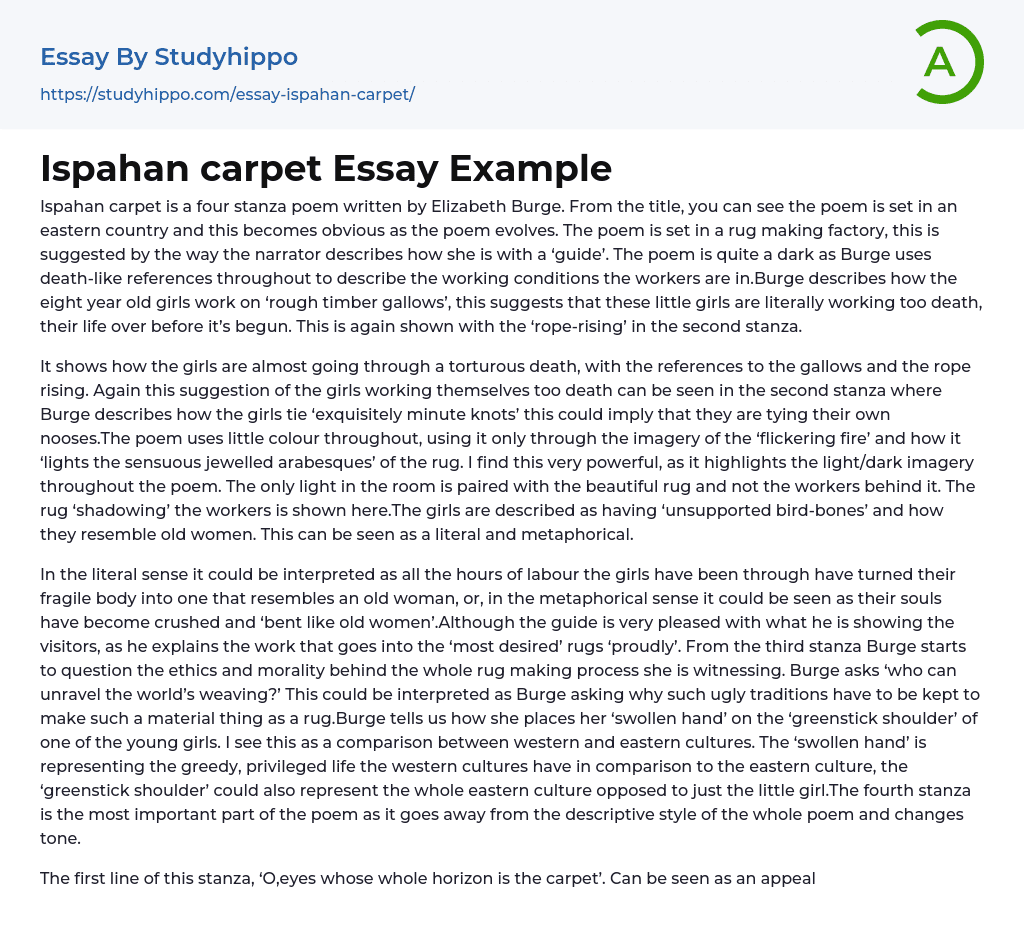Ispahan carpet is a four stanza poem written by Elizabeth Burge. From the title, you can see the poem is set in an eastern country and this becomes obvious as the poem evolves. The poem is set in a rug making factory, this is suggested by the way the narrator describes how she is with a ‘guide’. The poem is quite a dark as Burge uses death-like references throughout to describe the working conditions the workers are in.Burge describes how the eight year old girls work on ‘rough timber gallows’, this suggests that these little girls are literally working too death, their life over before it’s begun. This is again shown with the ‘rope-rising’ in the second stanza.
It shows how the girls are almost going through a torturous death, with the references to the gallows and the rope rising. Aga
...in this suggestion of the girls working themselves too death can be seen in the second stanza where Burge describes how the girls tie ‘exquisitely minute knots’ this could imply that they are tying their own nooses.The poem uses little colour throughout, using it only through the imagery of the ‘flickering fire’ and how it ‘lights the sensuous jewelled arabesques’ of the rug. I find this very powerful, as it highlights the light/dark imagery throughout the poem. The only light in the room is paired with the beautiful rug and not the workers behind it. The rug ‘shadowing’ the workers is shown here.The girls are described as having ‘unsupported bird-bones’ and how they resemble old women. This can be seen as a literal and metaphorical.
In the literal sense it could be interpreted as al
the hours of labour the girls have been through have turned their fragile body into one that resembles an old woman, or, in the metaphorical sense it could be seen as their souls have become crushed and ‘bent like old women’.Although the guide is very pleased with what he is showing the visitors, as he explains the work that goes into the ‘most desired’ rugs ‘proudly’. From the third stanza Burge starts to question the ethics and morality behind the whole rug making process she is witnessing. Burge asks ‘who can unravel the world’s weaving?’ This could be interpreted as Burge asking why such ugly traditions have to be kept to make such a material thing as a rug.Burge tells us how she places her ‘swollen hand’ on the ‘greenstick shoulder’ of one of the young girls. I see this as a comparison between western and eastern cultures. The ‘swollen hand’ is representing the greedy, privileged life the western cultures have in comparison to the eastern culture, the ‘greenstick shoulder’ could also represent the whole eastern culture opposed to just the little girl.The fourth stanza is the most important part of the poem as it goes away from the descriptive style of the whole poem and changes tone.
The first line of this stanza, ‘O,eyes whose whole horizon is the carpet’. Can be seen as an appeal from Burge too recognises the shame of what is happening to these girls. Their lives have been taken before they’ve even begun. The phrase ‘traditional beauty!’ could be seen as sarcasm here by Burge as she could be implying that the way the carpets are made traditionally outweighs
the beauty of the end result, would a rug really be as beautiful if you saw the broken young girls behind it?I find the poem overall to have a slight tinge of arrogance, I feel Burge questions the children’s eastern culture based purely on her western upbringing. Although I do feel that child labour is wrong, I also find that questioning someone else’s culture is wrong.In conclusion I feel this poem makes the reader question what true beauty actually is and whether the overall price, regardless of the monetary price, is actually worth the end result.
- Clothing essays
- Footwear essays
- Fashion design essays
- Cosmetic Surgery essays
- Jeans essays
- Book Summary essays
- Metaphor essays
- Reader essays
- Rhyme essays
- Literary devices essays
- Villain essays
- Books essays
- Genre essays
- Literary Criticism essays
- Writer essays
- Protagonist essays
- Simile essays
- Poem essays
- Book Report essays
- Book Review essays
- Greek Mythology essays
- Plot essays
- Tragic Hero essays
- Coming of Age essays
- Play essays
- Rhetoric essays
- Rhetorical Question essays
- Translation essays
- Understanding essays
- Reason essays
- Character essays
- Letter essays
- American Literature essays
- Literature Review essays
- Utopia essays
- Poetry Analysis essays
- Dante's Inferno essays
- Between The World and Me essays
- Incidents in The Life of a Slave Girl essays
- Flowers for Algernon essays
- Myth essays
- Everyday Use essays
- Boo Radley essays
- Genesis essays
- Richard iii essays
- Alice in Wonderland essays
- On the road essays
- Ozymandias essays
- The Nightingale essays
- Holden Caulfield essays




